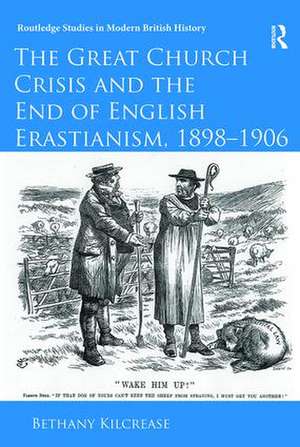The Great Church Crisis and the End of English Erastianism, 1898-1906: Routledge Studies in Modern British History
Autor Bethany Kilcreaseen Limba Engleză Paperback – 28 iun 2018
The Crisis led to a temporary revival of Erastianism as protestant groups sought to stamp out Catholicism within the established church through legislation whilst Anglo-Catholics, who valued ecclesiastical autonomy, opposed any such attempts. The eventual victory of forces in favor of greater ecclesiastical autonomy ended parliamentary attempts to control church practice, sounding the death knell of Erastianism. Despite increased acknowledgment that religious concerns remained deep-seated around the turn of the century, historians have failed to recognize that this period witnessed a high point in Protestant-Catholic antagonism and a shift in the relationship between the established church and Parliament. Parliament’s increasing unwillingness to address ecclesiastical concerns in this period was not an example advancing political secularity. Rather, Parliament’s increased reluctance to engage with the Church of England illustrates the triumph of an anti-Erastian conception of church-state relations.
| Toate formatele și edițiile | Preț | Express |
|---|---|---|
| Paperback (1) | 329.48 lei 6-8 săpt. | |
| Taylor & Francis – 28 iun 2018 | 329.48 lei 6-8 săpt. | |
| Hardback (1) | 875.55 lei 6-8 săpt. | |
| Taylor & Francis – 5 dec 2016 | 875.55 lei 6-8 săpt. |
Din seria Routledge Studies in Modern British History
-
 Preț: 311.91 lei
Preț: 311.91 lei -
 Preț: 325.49 lei
Preț: 325.49 lei - 9%
 Preț: 934.91 lei
Preț: 934.91 lei -
 Preț: 311.41 lei
Preț: 311.41 lei - 9%
 Preț: 1490.11 lei
Preț: 1490.11 lei -
 Preț: 311.18 lei
Preț: 311.18 lei -
 Preț: 327.47 lei
Preț: 327.47 lei -
 Preț: 334.03 lei
Preț: 334.03 lei -
 Preț: 310.88 lei
Preț: 310.88 lei -
 Preț: 311.41 lei
Preț: 311.41 lei -
 Preț: 311.41 lei
Preț: 311.41 lei -
 Preț: 311.41 lei
Preț: 311.41 lei -
 Preț: 290.17 lei
Preț: 290.17 lei -
 Preț: 286.76 lei
Preț: 286.76 lei - 18%
 Preț: 1000.27 lei
Preț: 1000.27 lei - 18%
 Preț: 999.02 lei
Preț: 999.02 lei -
 Preț: 417.60 lei
Preț: 417.60 lei - 31%
 Preț: 762.50 lei
Preț: 762.50 lei -
 Preț: 484.85 lei
Preț: 484.85 lei -
 Preț: 436.14 lei
Preț: 436.14 lei -
 Preț: 371.30 lei
Preț: 371.30 lei - 18%
 Preț: 1000.27 lei
Preț: 1000.27 lei -
 Preț: 369.73 lei
Preț: 369.73 lei - 18%
 Preț: 1003.30 lei
Preț: 1003.30 lei -
 Preț: 383.93 lei
Preț: 383.93 lei - 18%
 Preț: 1000.27 lei
Preț: 1000.27 lei - 12%
 Preț: 299.52 lei
Preț: 299.52 lei - 18%
 Preț: 1002.32 lei
Preț: 1002.32 lei -
 Preț: 410.07 lei
Preț: 410.07 lei - 26%
 Preț: 875.55 lei
Preț: 875.55 lei - 18%
 Preț: 1008.65 lei
Preț: 1008.65 lei - 25%
 Preț: 823.63 lei
Preț: 823.63 lei -
 Preț: 384.48 lei
Preț: 384.48 lei - 26%
 Preț: 846.78 lei
Preț: 846.78 lei - 18%
 Preț: 1005.04 lei
Preț: 1005.04 lei - 25%
 Preț: 851.40 lei
Preț: 851.40 lei - 30%
 Preț: 771.17 lei
Preț: 771.17 lei - 25%
 Preț: 658.36 lei
Preț: 658.36 lei - 29%
 Preț: 653.49 lei
Preț: 653.49 lei - 18%
 Preț: 891.36 lei
Preț: 891.36 lei
Preț: 329.48 lei
Preț vechi: 424.23 lei
-22% Nou
Puncte Express: 494
Preț estimativ în valută:
63.04€ • 66.18$ • 52.33£
63.04€ • 66.18$ • 52.33£
Carte tipărită la comandă
Livrare economică 11-25 aprilie
Preluare comenzi: 021 569.72.76
Specificații
ISBN-13: 9781138330146
ISBN-10: 1138330140
Pagini: 234
Dimensiuni: 156 x 234 x 22 mm
Greutate: 0.43 kg
Ediția:1
Editura: Taylor & Francis
Colecția Routledge
Seria Routledge Studies in Modern British History
Locul publicării:Oxford, United Kingdom
ISBN-10: 1138330140
Pagini: 234
Dimensiuni: 156 x 234 x 22 mm
Greutate: 0.43 kg
Ediția:1
Editura: Taylor & Francis
Colecția Routledge
Seria Routledge Studies in Modern British History
Locul publicării:Oxford, United Kingdom
Cuprins
Terminological Preface
Acknowledgments
List of Abbreviations
1 Introduction
2 The Church Crisis and Erastianism
3 Never Trust a Clergyman in Black: British Anti-Catholicism during the Great Church Crisis
4 William Harcourt’s Protestant Erastianism: Church and State, 1898–1900
5 Protestant Paranoia and Catholic Conspiracies: Protestant and Catholic Perspectives on the Second Anglo-Boer War, 1899–1902
6 Arthur Balfour and coming the Triumph of Ecclesiastical Independence, 1898–1902
7 A New Front in the Church Crisis: The 1902 Education Act
8 The Royal Commission on Ecclesiastical Discipline, another Education Bill, and the Implosion of Erastianism
9 Conclusion
Appendix
Bibliography
Index
Acknowledgments
List of Abbreviations
1 Introduction
2 The Church Crisis and Erastianism
3 Never Trust a Clergyman in Black: British Anti-Catholicism during the Great Church Crisis
4 William Harcourt’s Protestant Erastianism: Church and State, 1898–1900
5 Protestant Paranoia and Catholic Conspiracies: Protestant and Catholic Perspectives on the Second Anglo-Boer War, 1899–1902
6 Arthur Balfour and coming the Triumph of Ecclesiastical Independence, 1898–1902
7 A New Front in the Church Crisis: The 1902 Education Act
8 The Royal Commission on Ecclesiastical Discipline, another Education Bill, and the Implosion of Erastianism
9 Conclusion
Appendix
Bibliography
Index
Recenzii
"Kilcrease’s monograph is a welcome and timely addition to the growing literature reasserting the central place of religion in late-nineteenth and early twentieth-century British political discourse. (...) Kilcrease has done a tremendous service in putting the spotlight once more on a neglected episode—and certainly a crisis of sorts—in British political and religious history." - Jeremy Morris, Trinity Hall, University of Cambridge
Descriere
This book traces the history of the "Church Crisis", a conflict between the Protestant and Anglo-Catholic (Ritualist) parties within the Church of England between 1898 and 1906. During this period increasing numbers of Britons embraced Anglo-Catholicism and even converted to Roman Catholicism. Despite increased acknowledgement that religious concerns remained deep-seated around the turn of the century, historians have failed to recognize that this period witnessed a high point in Protestant-Catholic antagonism and a shift in the relationship between the established church and Parliament.
